19.
Trembling, she snatch'd him[1] from th' unequal strife,
In other fields the torrent to repel;
For nobler combats, here, reserv'd his life,
To lead the band, where godlike Falkland[2] fell.
20.
From thee, poor pile! to lawless plunder given,
While dying groans their painful requiem sound,
Far different incense, now, ascends to Heaven,
Such victims wallow on the gory ground.
21.
There many a pale and ruthless Robber's corse,
Noisome and ghast, defiles thy sacred sod;
O'er mingling man, and horse commix'd with horse,
Corruption's heap, the savage spoilers trod.
22.
Graves, long with rank and sighing weeds o'erspread,
Ransack'd resign, perforce, their mortal mould:
From ruffian fangs, escape not e'en the dead,
Racked from repose, in search for buried gold.
- ↑ Lord Byron and his brother Sir William held high commands in the royal army. The former was general-in-chief in Ireland, lieutenant of the Tower, and governor to James, Duke of York, afterwards the unhappy James II.; the latter had a principal share in many actions. [Vide ante, p. 3, note 1.]
- ↑ Lucius Cary, Lord Viscount Falkland, the most accomplished man of his age, was killed at the Battle of Newbury, charging in the ranks of Lord Byron's regiment of cavalry.
